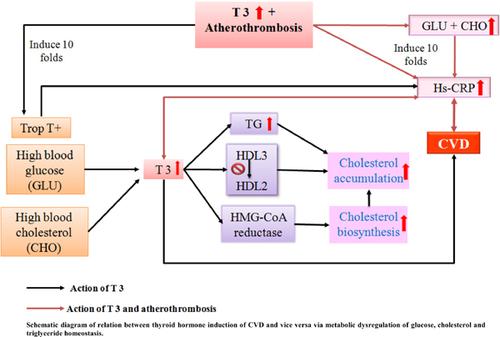Endocrine, Metabolic & Immune Disorders - Drug Targets ( IF 2.0 ) Pub Date : 2021-06-30 , DOI: 10.2174/1871530320666200917114501 Mobidullah Khan 1 , Suchismita Mukherjee 1 , Sarbashri Bank 1 , Smarajit Maiti 1

|
Background: Cardiovascular-diseases (CVD) are caused by different metabolic-anomalies related to hypertension/sedentary lifestyle/drug-addiction/dyslipidemia and diabetes. The scanty report suggests that metabolic-rate regulating thyroid hormones are linked to CVD.
Methods: A total of 59 individuals (male, >45 yrs) were involved in this study. Blood-samples from diagnosed cardiac-patients troponin (N=13, trop-T+), individuals with high-risk (N=15) (high glucose/cholesterol/triglycerides), and with age-matched controls (N=31) were tested for the evaluation of lipid-profiles/thyroid-hormones; Triiodothyronine, Thyroxine, and thyroid-stimulating hormone (T3/T4/TSH), blood-glucose/oxidative-stress indicators like malondialdehyde(MDA)/ non-protein-soluble-thiol(NPSH) and metabolic inflammatory-marker; human C-reactive protein hsCRP by biochemical-methods/ELISA.
Results: Correlation-data suggest that in normal conditions, there is no significant correlation between thyroid-hormones and other parameters. On the contrary, blood-glucose/triglyceride/uric-acid/ proteins are correlated in cardiac and high-risk patients, suggesting hypermetabolic conversion of nutrients by biochemical connectors like the TCA cycle and gluconeogenesis pathways. Further, the hypermetabolic-state is favored by the rise in the thyroid hormones level. In the high-glucose group, there is a significant correlation between metabolic-parameter and oxidative-stress indices like uric-acid/NPSH/MDA. T3 and T4 have also been linked to the serum-protein. But in the trop t+ group, all thyroid hormones have been significantly associated with blood cholesterol/triglyceride and glucose, suggesting the increasing involvement of thyroid-hormone in risk-factors and disease groups. The hsCRP level was ~100% and ~5-fold higher in high cholesterol and trop t+ groups, respectively. T3 was also ~70%, ~4.5-fold, and ~3.5-fold higher in high-glucose/high-cholesterol/ trop-t+ groups, respectively. This suggests that T3/TSH is linked to pathogenesis and severity.
Conclusion: Dyslipidemia, oxidant-stress in association with T3, augments cardiac-pathogenesis.
中文翻译:

甲状腺激素和氧化应激在心血管疾病中的作用
背景:心血管疾病 (CVD) 是由与高血压/久坐的生活方式/药物成瘾/血脂异常和糖尿病相关的不同代谢异常引起的。缺乏报告表明,调节代谢率的甲状腺激素与心血管疾病有关。
方法:共有 59 名个体(男性,> 45 岁)参与了这项研究。来自确诊心脏病患者肌钙蛋白(N=13,trop-T+)、高危个体(N=15)(高葡萄糖/胆固醇/甘油三酯)和年龄匹配对照(N=31)的血样是测试评估脂质特征/甲状腺激素;三碘甲腺原氨酸、甲状腺素和促甲状腺激素(T3/T4/TSH),血糖/氧化应激指标如丙二醛(MDA)/非蛋白可溶性硫醇(NPSH)和代谢炎症标志物;人 C 反应蛋白 hsCRP 通过生化方法/ELISA。
结果:相关性数据表明,在正常情况下,甲状腺激素与其他参数之间没有显着相关性。相反,血糖/甘油三酯/尿酸/蛋白质在心脏病和高危患者中是相关的,这表明通过 TCA 循环和糖异生途径等生化连接器对营养物质的代谢过度。此外,甲状腺激素水平升高有利于代谢亢进状态。在高糖组中,代谢参数与氧化应激指数(如尿酸/NPSH/MDA)之间存在显着相关性。T3 和 T4 也与血清蛋白有关。但在 trop t+ 组中,所有甲状腺激素都与血液胆固醇/甘油三酯和葡萄糖显着相关,表明甲状腺激素越来越多地参与危险因素和疾病组。hsCRP 水平在高胆固醇组和 trop t+ 组中分别高约 100% 和约 5 倍。在高葡萄糖/高胆固醇/trop-t+ 组中,T3 也分别高约 70%、约 4.5 倍和约 3.5 倍。这表明 T3/TSH 与发病机制和严重程度有关。
结论:血脂异常、氧化应激与 T3 相关,增加了心脏发病机制。











































 京公网安备 11010802027423号
京公网安备 11010802027423号